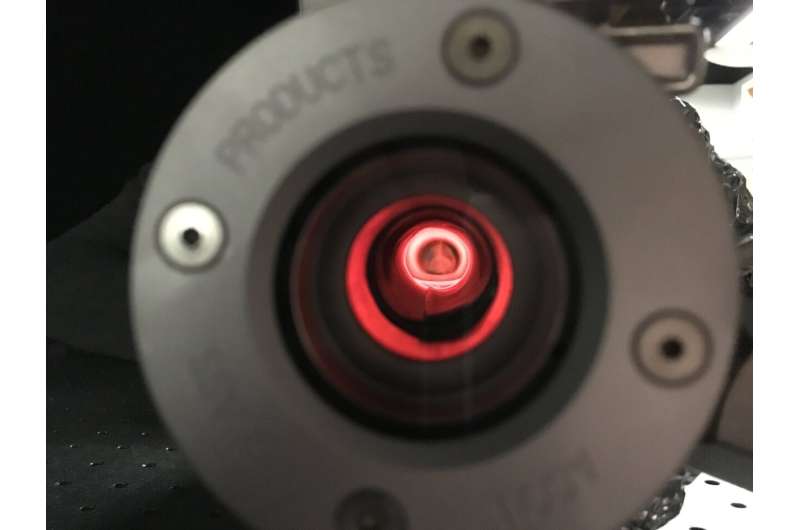This article has been reviewed according to Science X's editorial process and policies. Editors have highlighted the following attributes while ensuring the content's credibility:
fact-checked
peer-reviewed publication
trusted source
proofread
Embracing variations: Physicists first to analyze noise in Lambda-type quantum memory

In the future, communications networks and computers will use information stored in objects governed by the microscopic laws of quantum mechanics. This capability can potentially underpin communication with greatly enhanced security and computers with unprecedented power. A vital component of these technologies will be memory devices capable of storing quantum information to be retrieved at will.
Virginia Lorenz, a professor of physics at the University of Illinois Urbana-Champaign, studies Lambda-type optical quantum memory devices, a promising technology that relies on light interacting with a large group of atoms. She is developing a device based on hot metallic vapor with graduate student Kai Shinbrough.
As the researchers work towards a practical device, they are also providing some of the first theoretical analyses of Lambda-type devices. Most recently, they reported the first variance-based sensitivity analysis describing the effects of experimental noise and imperfections in Physical Review A.
"Prior to this paper, you would just have to assume that everything in the quantum memory behaves ideally," Shinbrough said. "This is the first time that things like noise have been considered, and the results of our analyses inform experimental design."
Lambda-type quantum memory uses a collection of atoms that interacts with two kinds of light: single photons containing quantum information that are absorbed, and powerful laser pulses controlling when the photons' information is absorbed and released. There are several storage-and-retrieval protocols that rely on different mechanisms, and the best choice is determined by the properties of the atoms and the controlling laser pulses.
Past analyses of these protocols assumed ideal conditions. Effects like device noise and small errors in experimental settings were not discussed. Shinbrough and Lorenz needed to understand these effects to develop a robust quantum memory device, so they filled this gap in the literature. They analyzed the impact of both random device noise and slow overall drift in experimental parameters on a Lambda-type device's memory efficiency, a measure of how often the device works as intended.
"The techniques we used are well established in classical physics and engineering, but we're applying them to a quantum system for the first time," Shinbrough said.
In addition to considering how noise and drift in experimental parameters individually impact device performance, the researchers used the technique of Sobol' sensitivity analysis to study how the simultaneous variation of all parameters impacts the memory efficiency. This allowed them to identify the parameters that had the most significant impact for each protocol and determine how variations in different parameters combine.
Shinbrough explained that the central result of this analysis is understanding how different experimental parameters may be tuned to compensate for imperfections in different settings. He gave the example of variation in the arrival times of the control pulse and the single photon. Each memory mechanism relies on a carefully tuned delay in the arrival times. If this delay begins to drift, then the control pulse can be made to last longer in time so the overlap with the single photon is roughly the same and the impact on memory efficiency is mitigated.
The results of this analysis have informed Shinbrough and Lorenz's experimental efforts. The researchers found that certain effects like variations in the hot metal vapor are often negligible while others like the characteristics of the controlling pulse can have a significant impact on experimental performance.
"Our analyses have allowed us to develop a better-informed experiment taking full advantage of our device's properties," Lorenz said. "Moreover, we have developed a framework that allows others to perform the same analyses for their experiments."
More information: Kai Shinbrough et al, Variance-based sensitivity analysis of Λ -type quantum memory, Physical Review A (2023). DOI: 10.1103/PhysRevA.107.033703
Journal information: Physical Review A





















